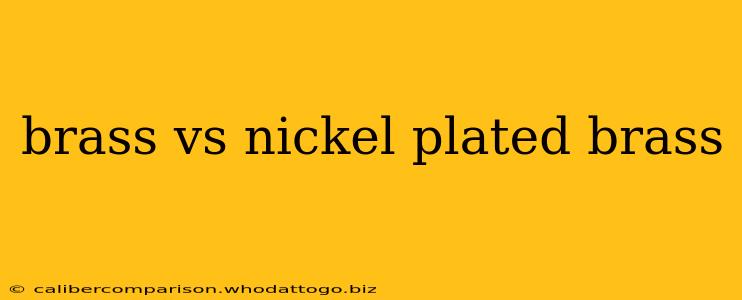Choosing between brass and nickel-plated brass often comes down to aesthetics, durability, and the specific application. Both are popular materials used in various industries, from musical instruments to plumbing fixtures, but their properties differ significantly. This detailed comparison will help you understand the key distinctions and make an informed decision.
What is Brass?
Brass is a copper-zinc alloy, prized for its attractive golden color, corrosion resistance, and malleability. The exact properties of brass depend on the specific ratio of copper and zinc, leading to variations in strength, ductility, and color. Common applications include:
- Musical Instruments: The rich tone of brass makes it ideal for instruments like trumpets, trombones, and tubas.
- Plumbing Fixtures: Its durability and resistance to corrosion make it suitable for faucets, valves, and fittings.
- Hardware: Doorknobs, hinges, and other hardware components often utilize brass for its attractive appearance and resistance to wear.
- Ornamental Uses: Sculptures, decorative items, and architectural details frequently incorporate brass for its aesthetic appeal.
What is Nickel Plated Brass?
Nickel plating is a process where a thin layer of nickel is electrochemically deposited onto a brass substrate. This process enhances the brass's properties in several ways:
- Enhanced Corrosion Resistance: Nickel acts as a protective barrier, significantly improving resistance to oxidation and tarnishing, making the brass more durable in harsh environments.
- Improved Appearance: Nickel plating provides a brighter, more uniform finish, often with a silvery-white sheen. This can be preferred over the natural golden hue of brass, depending on design aesthetics.
- Increased Hardness: The nickel layer adds a degree of hardness, improving the scratch resistance of the brass.
Key Differences: A Head-to-Head Comparison
| Feature | Brass | Nickel Plated Brass |
|---|---|---|
| Color | Golden Yellow | Silver-White (depending on nickel finish) |
| Corrosion Resistance | Moderate | High |
| Hardness | Moderate | Higher |
| Tarnish Resistance | Low | High |
| Cost | Generally Lower | Generally Higher |
| Maintenance | Requires regular polishing/cleaning | Requires less frequent cleaning |
| Applications | Musical instruments, plumbing, hardware | Similar to brass, but preferred where high corrosion resistance is crucial |
Brass: Pros and Cons
Pros:
- Cost-effective: Generally less expensive than nickel-plated brass.
- Attractive golden color: Appeals to many design styles.
- Easy to work with: Malleable and easily shaped.
Cons:
- Prone to tarnishing: Requires regular cleaning and polishing.
- Lower corrosion resistance: May not be suitable for all environments.
- Softer than nickel-plated brass: More susceptible to scratches and wear.
Nickel Plated Brass: Pros and Cons
Pros:
- Superior corrosion resistance: Longer lifespan and reduced maintenance.
- Brighter, more uniform finish: A more modern and versatile aesthetic.
- Increased hardness and durability: More resistant to scratches and wear.
Cons:
- Higher cost: More expensive than unplated brass.
- Can peel or chip: If the plating is damaged, the underlying brass is exposed.
- Less malleable: More difficult to shape and work with than brass.
Choosing the Right Material
The best choice between brass and nickel-plated brass depends entirely on your specific needs and priorities. Consider the following factors:
- Budget: Brass offers a more affordable option.
- Environment: Nickel-plated brass is ideal for harsh or corrosive environments.
- Aesthetic preferences: Choose the color and finish that best suits your design.
- Durability requirements: Nickel-plated brass offers superior hardness and scratch resistance.
By carefully weighing these factors, you can select the material that best meets your requirements for functionality, aesthetics, and longevity. Understanding the nuances of each material will lead to a more informed and satisfying choice for your project.

